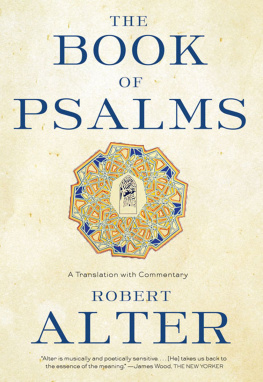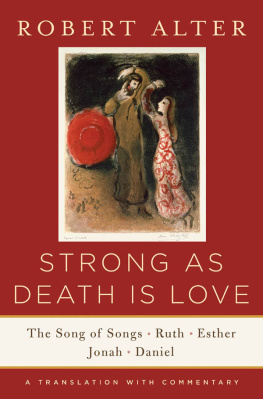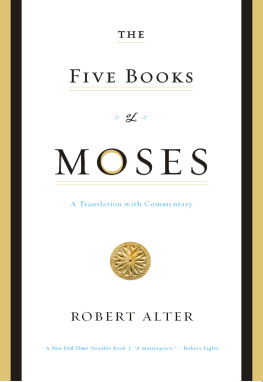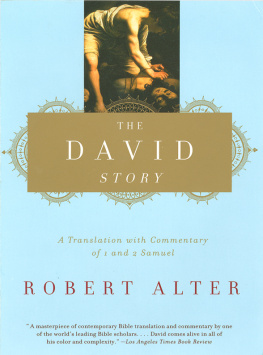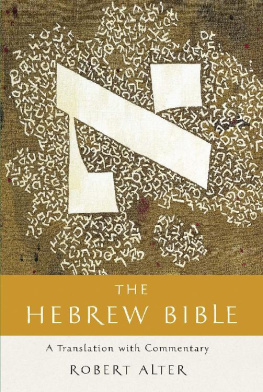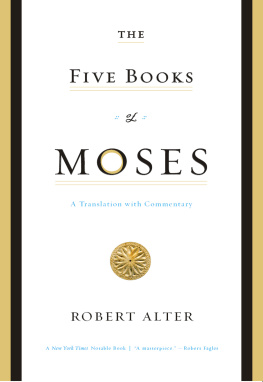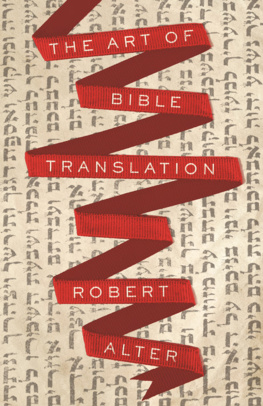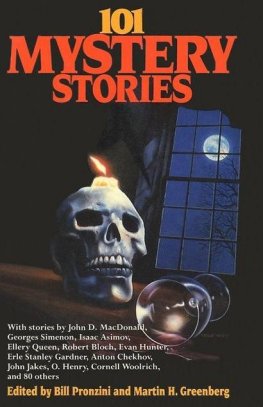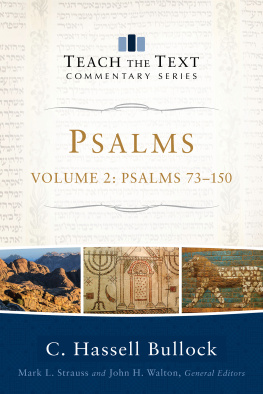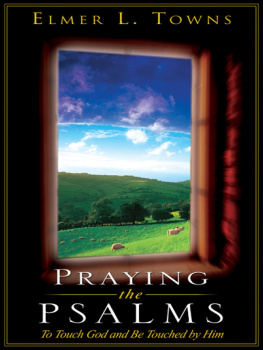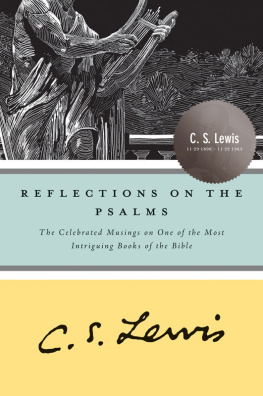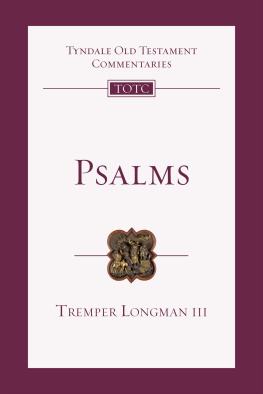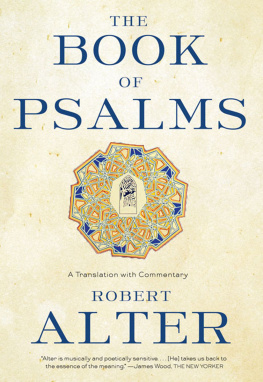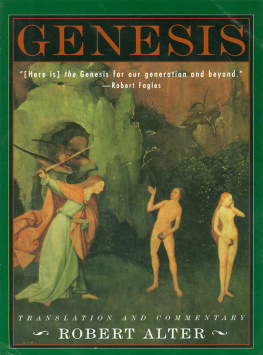Robert Alter - The Book of Psalms
Here you can read online Robert Alter - The Book of Psalms full text of the book (entire story) in english for free. Download pdf and epub, get meaning, cover and reviews about this ebook. year: 2007, publisher: W. W. Norton & Company, Inc., genre: Religion. Description of the work, (preface) as well as reviews are available. Best literature library LitArk.com created for fans of good reading and offers a wide selection of genres:
Romance novel
Science fiction
Adventure
Detective
Science
History
Home and family
Prose
Art
Politics
Computer
Non-fiction
Religion
Business
Children
Humor
Choose a favorite category and find really read worthwhile books. Enjoy immersion in the world of imagination, feel the emotions of the characters or learn something new for yourself, make an fascinating discovery.
- Book:The Book of Psalms
- Author:
- Publisher:W. W. Norton & Company, Inc.
- Genre:
- Year:2007
- Rating:4 / 5
- Favourites:Add to favourites
- Your mark:
- 80
- 1
- 2
- 3
- 4
- 5
The Book of Psalms: summary, description and annotation
We offer to read an annotation, description, summary or preface (depends on what the author of the book "The Book of Psalms" wrote himself). If you haven't found the necessary information about the book — write in the comments, we will try to find it.
The Book of Psalms — read online for free the complete book (whole text) full work
Below is the text of the book, divided by pages. System saving the place of the last page read, allows you to conveniently read the book "The Book of Psalms" online for free, without having to search again every time where you left off. Put a bookmark, and you can go to the page where you finished reading at any time.
Font size:
Interval:
Bookmark:

One of the best outcomes of Alters translation is a sense of an abrupt, muscular intensity; he restores to the Psalms a kind of strangeness that emanates from an encounter with a culture we recognize yet is distinctly alien to us, far removed in time and frame of mind.
Mark Doty, Los Angeles Times
Alter stands out for his combination of scholarly accuracy with a poets ear.
Angels on Earth
Every reader of this translation will be led towards fresh thoughts and will discover favorites that inspire the imagination in new, rich ways.
Walter Brueggemann, Christian Century
In his compelling and swiftly moving translations, Alter has thrust the reader back to the place where the monotheistic religions were born out of even more ancient beginnings.
Jewish Book World
Alter is amazingly successful. [His] translations of many famous passages are primordially spare and dignified, the work of a scholar with an unusually sure ear for verse.
Christopher Tayler, Saturday Guardian
Alters translationoffers both clarity and fidelity to the meaning, meter, and nuances of the original Hebrew.
Library Journal
The achievement of this new translation is to present the Book of Psalms as a wonder of ancient literature.
The Tablet
A marvelous translation, unsurpassed in its accuracy and poetry. The publication of The Book of Psalms is a watershed event, and from the seeds Alter has sown we all reap in joy.
Joel M. Hoffman, Jerusalem Post
Alters Psalms is a heavy book, because of the large, easily readable printand the generous commentary. It is not the sort of book one would normally schlep to the hospital for distraction, but it proved the only one in those months that could absorb meas a poet, a scholar, and most of all, as a person in spiritual doubt and great need.
Karen Alkalay-Gut, Jerusalem Report
ALSO BY ROBERT ALTER
IMAGINED CITIES : URBAN EXPERIENCE AND THE LANGUAGE OF THE NOVEL
THE FIVE BOOKS OF MOSES : A TRANSLATION WITH COMMENTARY
CANON AND CREATIVITY: MODERN WRITING AND THE AUTHORITY OF SCRIPTURE
THE DAVID STORY : A TRANSLATION WITH COMMENTARY
GENESIS : A TRANSLATION WITH COMMENTARY
HEBREW AND MODERNITY
THE WORLD OF BIBLICAL LITERATURE
NECESSARY ANGELS: TRADITION AND MODERNITY IN KAFKA, BENJAMIN, AND SCHOLEM
THE PLEASURES OF READING IN AN IDEOLOGICAL AGE
THE LITERARY GUIDE TO THE BIBLE
(coeditor with Frank Kermode)
THE INVENTION OF HEBREW PROSE
THE ART OF BIBLICAL POETRY
MOTIVES FOR FICTION
THE ART OF BIBLICAL NARRATIVE
A LION FOR LOVE: A CRITICAL BIOGRAPHY OF STENDHAL
DEFENSES OF THE IMAGINATION
PARTIAL MAGIC: THE NOVEL AS SELF-CONSCIOUS GENRE
MODERN HEBREW LITERATURE
AFTER THE TRADITION
FIELDING AND THE NATURE OF THE NOVEL
ROGUES PROGRESS: STUDIES IN THE PICARESQUE NOVEL
A Translation with Commentary

W. W. Norton & Company NEW YORK LONDON
Copyright 2007 by Robert Alter
All rights reserved
First published as a Norton 2009
For information about permission to reproduce selections from this book, write to Permissions, W. W. Norton & Company, Inc., 500 Fifth Avenue, New York, NY 10110
Library of Congress Cataloging-in-Publication Data
Bible. O.T. Psalms. English. Alter. 2007.
The book of Psalms: a translation with commentary / Robert Alter.
1st ed.
p. cm.
Includes bibliographical references.
ISBN: 978-0-393-33704-4
1. Bible. O.T. PsalmsCommentaries. I. Alter, Robert. II. Title.
BS1424.A48 2007
223'.2077dc22
2007013485
W. W. Norton & Company, Inc.
500 Fifth Avenue, New York, N.Y. 10110
www.wwnorton.com
W. W. Norton & Company Ltd.
Castle House, 75/76 Wells Street, W1T 3QT
IN MEMORY OF TOM ROSENMEYER
(19202007)
staunch friend, scrupulous reader,
exemplary guide to antiquity
T HE draft of this book was carefully scrutinized by two finely discerning readers of poetry, Carol Cosman and Michael Andr Bernstein. They labored heroically to prevent me from doing undue violence to the English language in my pursuit of fidelity to the Hebrew, and in most instances they succeeded. The eminent classicist T. G. Rosenmeyer read the revised draft and raised helpful questions pertaining to rigor and consistency. As with my translation of The Five Books of Moses , I have palpably benefited from the historically informed and philologically acute suggestions of my colleague in biblical studies, Ron Hendel. Steve Forman, my editor at W. W. Norton for more than a decade, raised a variety of helpful questions about the notes and the translation. Editorial assistance for this project was paid for through funds from the Class of 1937 Chair in Comparative Literature at the University of California, Berkeley. Janet Livingstone once again was patient and efficient in deciphering my handwriting (a reflection of my continuing attachment to archaic things) and converting it into orderly electronic text. I would like to thank Rabbi Israel Stein for catching many errors of reference and typographical errors in the hardcover edition and also for his intelligent interpretative suggestions. Beyond all these, I feel a kind of gratitude to the ancient Hebrew poets who have left us these wonderful poems that have been a joy for me to live with and attempt to convey in English.
I. HISTORICAL CONTEXTS
T HROUGH the ages, Psalms has been the most urgently, personally present of all the books of the Bible in the lives of many readers. Both Jewish and Christian tradition made it part of the daily and weekly liturgy. Untold numbers have repeatedly turned to Psalms for encouragement and comfort in moments of crisis or despair. The inner world of major Western writers from Augustine, Judah Halevi, and George Herbert to Emily Dickinson and Paul Celan was inflected by the reading of Psalms. But for all the power of these Hebrew poems to speak with great immediacy in many tongues to readers of different eras, they are in their origins intricately rooted in an ancient Near Eastern world that goes back to the late Bronze Age (16001200 BCE ) and that in certain respects is quite alien to modern people.
The prose narratives of the Hebrew Bible, despite the sundry links with the surrounding literatures that scholarship has identified, are formally innovative in striking ways. Indeed, it is arguable that at least as a set of techniques and conventions, they constitute the most original literary creation of the biblical writers. Psalms, on the other hand, or psalm-like cultic hymns and celebrations of the gods, were common in Egypt and Mesopotamia, and in Syro-Canaanite literature. We know this literature chiefly through the trove of texts found at the site of Ugarit, on the Mediterranean coast of present-day Syria, dating roughly from 1400 to 1200 BCE several centuries earlier than the main body of biblical writings. As previously unknown texts in the various ancient Near Eastern languages have been unearthed and deciphered over the past century, it has become clear that the psalmists not only adopted the formal system of poetry (about which more is said later) from the antecedent literature of the region but also tapped their predecessors for verbal formulas, imagery, elements of mythology, and even entire sequences of lines of poetry. Some scholars have gone so far as to claim that a few psalms are essentially Hebrew translations of pagan poems, though a comparison with the proposed originals suggests rather that what the psalmists did was to adapt, briefly cite, or even polemically transform the polytheistic poems, which is, after all, what poets everywhere do with their predecessorsboth building on them and emphatically making something new out of them.
Font size:
Interval:
Bookmark:
Similar books «The Book of Psalms»
Look at similar books to The Book of Psalms. We have selected literature similar in name and meaning in the hope of providing readers with more options to find new, interesting, not yet read works.
Discussion, reviews of the book The Book of Psalms and just readers' own opinions. Leave your comments, write what you think about the work, its meaning or the main characters. Specify what exactly you liked and what you didn't like, and why you think so.

